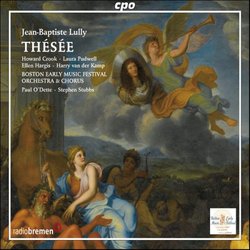Lully's Thesee
Robin Friedman | Washington, D.C. United States | 01/11/2008
(5 out of 5 stars)
"This CD presents the first complete recording of "Thesee" by Jean-Baptiste Lully (1632 -- 1687), the father of French opera. The recording has received numerous accolades: it was rated 10/10 by "Classics Today" and also appears on "Classics Today's" list of the 10 best CDs of 2007.
Lully was born in Florence, but by 1652 he had entered the service of Louis XIV as a dancer and quickly became a favorite of the monarch. Early in his career, Lully joined with Moliere in composing a series of comedie ballets. But he is chiefly remembered for his compositions of opera, tragedie-lyrique in collaboration with the librettist Phillipe Quniault between 1673-- 1686. Probably Lully's most famous opera is his final work in the form, "Armide" (1686) which was set again 80 years later to the same Quinalult libretto by Gluck. I had the rare pleasure of seeing both versions of "Armide" last year performed by another period performance group, the Opera Lafayette.
Lully's Thesee dates from 1675. Although the opera is obscure today, it remained in the active repertoire of the Paris Opera for over 100 years following its premiere. The opera combines an obesquious portrait of Louis XIV with music of grandeur, lyricism, and power. The opera begins with a lengthy prelude set in Versailles which characterizes the Sun King as supreme both in matters of military prowess and of love. The opera itself is set in ancient Athens but the allusions to life at the French court, with its romantic fickleness, would have been unmistakable to Lully's audience.
Quninault's libretto tells a complex story of inconstancy in love with Medea as the villain -- the same Medea famous in Greek mythology through her affair with Jason. In the opera, Medea is pledged to marry the king of Athens but she becomes enamored of the hero Theseus. Theseus is in love with a young princess, Aeglee. The King also wants to marry Aeglee, and he and Medea mutually end their engagement. Medea engages in many violent plots to destroy her rival Aeglee to win Theseus for herself, but in the end all her machinations fail. Near the end of the opera, Medea persuades the King to poison Theseus, but at the last moment the king realizes that Theseus is his long-lost son. Ultimately, the opera ends happily with the king relinquishing Aiglee in favor of the man she loves, the king's son, Theseus.
Early French opera was much more driven by the story line and drama than was Italian opera. In Thesee, arias and recitive sections meld together, rather than being separated as is the case with early Italian opera. French opera was also highly driven by the dance, and Thesee if full of instrumental and dance interludes, called divertissements.
Louis XIV taste in music was conservative, and Lully's music avoids harmonic adventures and contrapuntal writing. But Lully knew how to use what he had. Thesee is a work full of fanfare, of strongly rhythmic dance and song, of passion, particularly in the music for Medea, and of poignancy. There are also comic interludes -- for example the second act includes a scene for two old men bemoaning their growing old -- which did not appear in Lully's operas after Thesee. The orchestral scoring of the work is simple, but Lully mades great use of oboes and bassoons, the harpsichord, and the lute.
The performance on this CD is stunning and features the Boston Early Music Festival Orchestra & Chorus, a premiere early music ensemble, performing on period instruments. They performed Thesee live in 2001, and made this 3CD recording on the CFO label in 2006. Tenor Howard Crook performs the role of Thesee while soprano Laura Pudwell plays Medea. The supporting cast is also first-rate, but I think the best performance on this recording is by the 42 piece Boston Early Music Festival Orchestra. The CD includes through liner notes on the opera and a complete libretto and translation.
This wonderful recording will be a joy to lovers of the French Baroque.
Robin Friedman"
Perhaps the best performance of a French baroque opera by an
Zaida | Bremerton, WA | 08/13/2008
(5 out of 5 stars)
"To be honest, I had fairly low standards for this work. There have been fairly dull performances of baroque operas, especially French ones, by American groups. And I had heard mixed reviews of their performance of Ariadne. But I was pleasantly surprised, for this recording surpasses some of those done by Reyne, which all seem to be good, but not terribly energetic. This, on the other hand, is probably the best period instrument recording ever attempted by an American group, especially when one compares it to those done by Pearlman and Boston Baroque, or those atrocious ones by Palmer. Perhaps Niquet, Haïm, Christie, Minkowski, or Rousset could better perform and record this opera, but as of yet, they haven't. And there wouldn't be a need to."

